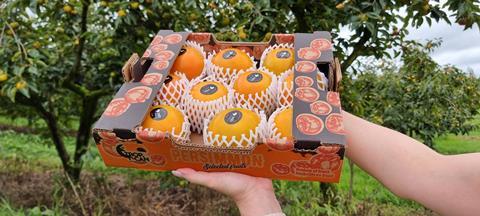MBR Company is expanding its production of Fuyu persimmon in response to strong international demand
Persimmons make up tiny percentage of Brazil’s overall fruit export basket, but thanks to their favourable commercial window, there is potential to grow exports to Europe and other markets.

MBR Company’s persimmon campaign is in full swing. Founded in 2004, the São Paulo-based import-export company supplies a wide portfolio of fruit including figs, melons, limes, mangoes, papayas, guavas, citrus, apples, dragon fruit and custard apple – as well as persimmon – to international retailers.
“Our persimmon export season starts on week 10 and it will go until week 18/19. We’ve found that this window fits perfectly in the European calendar, as well as other destinations such as Canada, the Middle East, Singapore and Hong Kong,” says founder and director Fernando Ferreira.
He says the 2024 season is going well. “We are running solid programmes to a wide range of clients into four continents with stable prices, at very similar levels to last year. Usually as the season reaches its end, prices tend to fall slightly,” he notes.
As with many other fruits in Brazil, the strength of local demand makes it difficult to establish and maintain regular export programmes. As Ferreira explains, “the biggest competitor of Brazilian fruit exporters is the internal market”. With a population of around 215m and high per-capita consumption, export volumes are always dependent on how the internal market is behaving.
Nevertheless, Ferreira is optimistic about the fruit’s export potential given its high level of acceptance on the international market, especially in terms of its flavour.
The Fuyu variety accounts for the bulk of Brazil’s fresh persimmon exports. It is a sweet and non-astringent variety producing medium-sized deep red-orange fruit with a lighter pale-orange flesh.
“Fuyu stands out for its absence of seeds and for having a more firm and crunchy flesh than some of the other varieties we produce,” Ferreira continues. “At MBR we export 100 per cent of our persimmons by air – there are some companies that are trialling sea freight but our view is that the fruit is not suitable for longer transit times as its quality is compromised.”
Production of Rojo Brillante, the most widely-grown variety in Spain, in still very small in Brazil. Ferreira says there are some experimental plantings that are adapting well in the south of the country, but commercial volumes are still on a small scale.
In terms of Fuyu, MBR Company says it is expanding its acreage by approximately 30 per cent. This will enter full commercial production in 2026.
According to the Brazilian Institute of Geography and Statistics, Brazil had around 7,700ha of persimmon production in 2022, spread across all varieties. This was concentrated mainly in the southeast and southern regions of the country.



